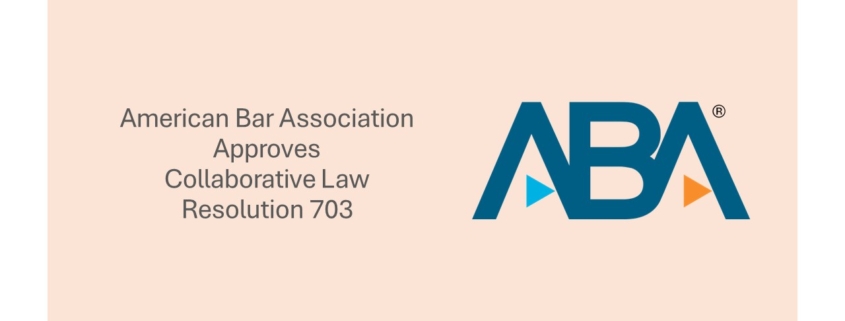ABA Approves Collaborative Law Resolution 703
The American Bar Association (“ABA”) House of Delegates has just approved Resolution 703, which promotes the Uniform Collaborative Law Act and Uniform Collaborative Law Rules (“UCLA”). In 2016, after many years of effort from professionals around the state, Florida adopted a version of the UCLA for use in divorce and family law.
Below are parts of the text (citations omitted) from Resolution 703:
ADOPTED
AMERICAN BAR ASSOCIATION
NATIONAL CONFERENCE OF COMMISSIONERS ON UNIFORM STATE LAWS
SECTION OF DISPUTE RESOLUTION
SECTION OF STATE AND LOCAL GOVERNMENT LAW
REPORT TO THE HOUSE OF DELEGATES
RESOLUTION RESOLVED, that the American Bar Association approves the Uniform Collaborative Law Rules and Uniform Collaborative Law Act, promulgated by the National Conference of Commissioners on Uniform State Laws in 2010, as appropriate Rules or an appropriate Act for those states desiring to adopt the specific substantive law suggested therein.
REPORT Collaborative law is a “voluntary, contractually based alternative dispute resolution process” whereby parties use collaborative attorneys to engage in negotiation to resolve their dispute and refrain from any litigation activity during the course of the representation. The parties agree in advance through their participation agreement, the contract governing the process, that the collaborative attorneys would be disqualified from representing the parties in court if the negotiations are unsuccessful.
Collaborative practice emerged in the late 1990s. In 2010, the National Conference of Commissioners on Uniform State Laws (“NCCUSL”) finalized the Uniform Collaborative Law Rules and Uniform Collaborative Law Act (“UCLA”) to govern the process. The drafters recognized that states may choose to adopt the act through legislation, similar to the adoption of laws governing other ADR processes, or as rules, similar to the adoption of rules governing lawyer conduct, or as a combination of both statutes and rules.
At the ABA Annual Meeting in 2011, the House of Delegates declined to adopt the UCLA by a vote of 298 to 154.4 Two primary concerns arose at the time. First, some participants questioned the ethics of a negotiation-only practice as a limited-scope representation. Second, others expressed concerns about the form of the UCLA as legislation, as opposed to being limited to court rules.
More than a decade has passed since the House of Delegates considered issues involving collaborative law, and the above concerns have been addressed. An overwhelming number of ethics opinions support the UCLA approach to collaborative practice. Further, each of the twenty-three jurisdictions that has adopted the UCLA has carefully considered the separation of powers issues and arrived at solutions that meet each jurisdiction’s need. Some jurisdictions adopted the law as a court rule, others as statute, and other jurisdictions, like Illinois and Alabama , used a hybrid approach and enacted provisions in statute and court rule.
***
ETHICS
Collaborative law is an ethical form of limited scope representation, and the UCLA’s provisions ensure conformity to best practices. The UCLA sets forth minimum requirements for a participation agreement, allows for a tribunal to issue emergency orders in appropriate cases, provides additional protections for low-income parties, requires collaborative attorneys to assess the appropriateness of collaborative law in each case, and requires collaborative attorneys to conduct case assessment for coercive or violent relationships to reasonably ensure participant safety.
The UCLA does not affect any of the lawyer’s duties under the Rules of Professional Conduct. Instead, the UCLA clarifies how some of those ethical rules relate specifically to the collaborative practice, particularly as it relates to the boundaries of the limited scope arrangement, the participation agreement, and post-withdrawal conflicts of interest.
In 2007, the American Bar Association Standing Committee on Ethics and Professional Responsibility issued Formal Opinion 07-447, in which the ABA stated that collaborative law represents “a permissible limited scope representation.” The Opinion specifically rejected the notion that “collaborative law practice sets up a nonwaivable conflict” of interest. In addition, between the years of 1997 and 2012, eleven jurisdictions issued ethics opinions approving the collaborative process, so long as certain conditions are met, such as ensuring informed consent (which is embedded in the UCLA). Colorado remains the only jurisdiction with an ethics opinion critical of collaborative law as an impermissible conflict of interest; however, the opinion allows collaborative law, provided that the lawyers do not sign the participation agreement. In 2021, Colorado adopted the UCLA maintaining that lawyers are not permitted to sign the participation agreement, but otherwise permissive of the practice.
The state ethics opinions largely arise from jurisdictions that subsequently enacted the UCLA. Four additional jurisdictions (Minnesota, Kentucky, Missouri, and South Carolina) also permit the practice of collaborative law by virtue of an ethics opinion. In other words, twenty- seven jurisdictions explicitly permit collaborative practice under state law, state ethical guidance, or both.
No jurisdictions have addressed the ethical questions regarding collaborative law in more than a decade – thus there appears to be emerging consensus that the practice is ethical, provided the lawyers meet their other ethical obligations under the Rules. Similarly, the number of collaborative lawyers continues to increase. These facts evidence the growing acceptance of collaborative law as a permitted, ethical practice.
We are thankful to the work of many professionals to get the ABA to approve this Collaborative Law Resolution. Those professionals include the late Kevin Scudder, a close friend and true peacemaker.
If you want to learn how Collaborative Law can help your family through divorce, click the button below.
Adam B. Cordover is a co-author of an American Bar Association book on Collaborative Law. He is a member of the Board of the International Academy of Collaborative Professionals and recipient of the inaugural Visionary Award of the Florida Academy of Collaborative Professionals. Adam has offices in Tampa, St. Petersburg, and Sarasota, and he represents clients virtually throughout the State of Florida.






